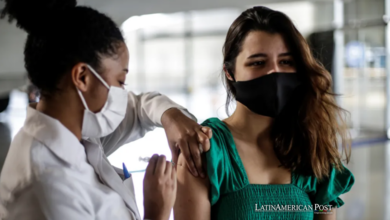Coronavirus and Reinfection: What can Happen if you Have Covid-19 Several Times?
There are Several Doubts About Coronavirus Reinfections. Find Out What the Experts say.

Photo: Freepik
LatinAmerican Post | Joshua Radesca
Listen to this article
Leer en español: Coronavirus y reinfección: ¿Qué puede pasar si tienes Covid-19 varias veces?
Although globally we get used to living with the latent presence of COVID-19 in our environment, it has not become a controlled threat. As indicated in the latest report of the Emergency Committee of the International Health Regulations on the coronavirus, held on July 8, "the cases of this disease notified to the WHO had increased by 30% in the last two weeks, largely in measure driven by the strains BA.4, BA.5 and others derived from the omicron and by the lifting of social and public health measures”.
Since its appearance, there have been multiple measures that we have had to adopt day by day to avoid getting sick with coronavirus. However, the number of infected does not stop, even the group of people who have had to face the coronavirus two, three or more times is quite large. Vaccination or having contracted COVID-19 does not ensure complete immunity. For this reason, reinfection (understood as an individual becoming infected, recovering and becoming infected again) is one of the aspects that generates the greatest doubt and concern about this virus.
Do I have immunity after recovering from coronavirus? Is it more serious or milder to have COVID-19 a second time? These are some questions raised by reinfection. In this article, we will tell you what the experts say on the subject.
Variants and reinfection
Early in the pandemic, people who got sick with Covid-19 after recovering used to have a period of immunity that spanned a few months. Recently, this has been changing. Variants play an important role in reinfection, since the immunity achieved by those who were cured of the first strains of coronavirus is violated by new variants, especially the omicron, which makes it more likely that a person will get sick again with a different strain of the virus.
A study from Weill Cornell Medicine in Qatar, published in The New England Journal of Medicine, explains that “natural infection with severe acute respiratory syndrome coronavirus 2 (SARS-CoV-2) elicits strong protection against reinfection with B. 1.1.7 (alpha), B.1.351 (beta), and B.1.617.2 (delta) variants. However, the B.1.1.529 (Omicron) variant harbors multiple mutations that may mediate immune evasion.”
From this, it can be concluded that the Omicron variant is the one that generates a higher degree of reinfection. This is the most transmissible strain and capable of eluding the immunity generated. Therefore, a person can become infected with omicron after recovering from a non-omicron variant. You could even get sick from one of the omicron sub-variants after beating a different version.
"We found that the effectiveness of a previous infection to prevent reinfection with the Alpha, Beta and Delta variants of SARS-CoV-2 was strong (by approximately 90%)," the study indicates, later delimiting that "such protection against reinfection with the Omicron variant was lower (approximately 60%)”.
Is reinfection more dangerous?
Contracting any variant of coronavirus always poses some kind of risk. Especially if you suffer from another medical condition of care. Although people who are vaccinated or have had COVID-19 are not immune to reinfection, they are better equipped to deal with the virus and its current variants. Which, in most cases, means that in the face of a new contagion the disease does not become very severe or fatal, but rather shorter and less serious.
It is important to point out that this does not mean that there are no symptoms in reinfection situations. Those infected may continue to experience fever, body aches, or any other typical symptoms of Covid-19. The difference is that, in percentage, these tend to be less acute. In the aforementioned investigation, it is explained that in the cases studied, “none of the reinfections progressed to critical or fatal coronavirus.” Likewise, it indicates that "the protection of the previous infection against hospitalization or death caused by reinfection appeared to be robust, regardless of the variant."
However, there is still a need to delve into studies that reveal the long-term consequences of repeatedly falling ill with Covid-19.
We recommend you read: Can you drink alcohol after receiving the vaccines?
What to do to reduce the risk of contracting COVID-19 again?
Apart from those basic indications offered by the WHO since the beginning of the pandemic, such as the correct use of face masks in crowded spaces, social distancing and handwashing, it is essential to get vaccinated and be aware of how many booster doses are necessary. Exercise and a good diet are other fundamental allies to keep our immune system in the most optimal conditions.
In short, it can be seen that the appearance of strains such as that of omicron, due to its greater capacity for infection, has increased the possibility of reinfection, which makes it necessary for people to maintain due precautions to avoid suffering from this virus repeatedly.




